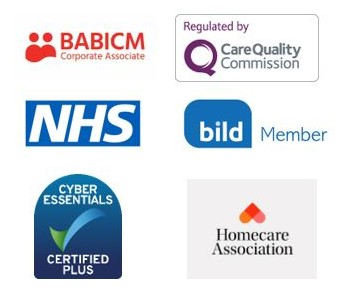The Empowering U umbrella encompasses Empowering U Complex Care (EUCC) and Empowering U Case Management (EUCM) in which both teams work in conjunction with one another to ensure a client with complex care needs receives the specialist care and support that they need in both the home and the community.
Empowering U Complex Care was launched in 2014 by the Jakhu family who have over 30 years’ experience owning and operating care providers in the UK. Originally based in the West Midlands, Empowering U have gone from strength to strength and now provide complex care services nationwide through a network of tightly knit, specialist and dedicated teams of complex carers.
Empowering U understood that to ensure the highest calibre of care and support to those with complex care needs, they needed to create a second strand to the business – Empowering U Case Management, which they launched in early 2023. The two interdependent halves of the business ensure a seamless integration of complex care and case management.
Empowering U Complex Care takes a truly holistic approach; engineering and implementing a multifaceted package of personalised care that is constantly monitored to ensure the client is receiving appropriate support.
Our complex care team work in tandem with one another, from the highly trained members of management to the support staff who have the skills and knowledge, this allows us to not focus on ‘what we can’t do’ but instead focus on what a client wants to achieve to enable them to lead a fulfilling life.
Empowering U Complex Care understand the need to provide a range of services to suit all of client’s needs:
Our team create bespoke support plans which capture the wishes and needs of a client. For example, if a client is an in-patient, our team will work closely with the discharge team to ensure a personalised care plan is ready to go upon discharge. Through one-to-one or two-to-one support and the assignment of ‘key workers’, we ensure that a client’s needs and rights are always upheld. Knowing there is always a safe, trustworthy team to rely on, means our clients feel empowered to communicate with us easily and freely. Our nurse-led care services are provided by a specialist team and include:
- Catheter, Bowel & Stoma care
- Complex Bowel Management
- Tracheostomy & Ventilated care
- PEG (Percutaneous endoscopic gastrostomy) and JEJ (Jejunostomy) Acquired Brain Injury support
- Suctioning Oral and Tracheal
- Oxygen Therapy
- Epilepsy Rescue Medication – Buccal Midazolam & Rectal Diazepam
- NG (Nasogastric)
- Ileostomy (Stoma / Colostomy)
- Cough Assist and Assisted Cough
- CPAP (Continuous Positive Airway Pressure)
- BPAP (Bilevel Positive Airway Pressure)
- NIPPY (Non-Invasive Positive Pressure Ventilation)
Our nursing team also provide Complex Care support in a household setting – all our clients are assigned key workers and are specialist providers of tailor-made care packages. We provide support for individuals with learning disabilities, mental health problems, Autistic-spectrum conditions, personality disorders, complex medical needs, and behaviours that challenge.
Personal care provides an intimate and physical care package to ensures a client is supported by a care worker with activities such as washing, dressing, general hygiene assistance, or just being there to offer reassurance and guidance if required. Our care workers aid with the following:
- Bathing / Showering
- Washing & Drying Hair
- Bed baths
- Continence & Incontinence care
- Toilet and Bathroom assistance
- Oral Hygiene
- Shaving, Hair & Beard Care
We understand the importance of inclusion and belonging within the community, and for clients with learning disabilities we fully embrace the vision of social inclusion. Working closely with relevant learning disability providers, current care providers, and other professionals to ensure we align our service to the exact needs.
We can help to guide the young person, their family and all professionals involved with current care to ensure that the progression from childhood to adulthood is as smooth and trouble free as possible. Clarity during this time is vital, therefore, we will always be on hand to discuss any concerns or fears you may have and can offer support, guidance and direction to the correct sources of information.
We ensure that loved ones are being taken care of at the highest standard, which provides you with the reassurance that you need to allow yourself to take a break. Occasion care is the support and care required to enable you, or a loved one, to attend that special event. It doesn’t matter the event; Empowering U will provide trained and experienced care professionals to enable you to attend the event safely and in comfort.
Empowering U Case Management have a team of 10 experienced case managers who provide clinical support and practical help to clients and their family whilst they navigate the litigation process. Our Case Managers are based throughout the country, and clients are matched with Case Managers based on proximity and specialist skillset. As a member of the British Association of Brain Injury and complex Case Management (BABICM), Empowering U supports both claimant and defendant parties through their litigation process and as such, have become a trusted partner for many Personal Injury Solicitors, Financial Deputies, and healthcare professionals throughout the UK.
All of our Case Managers are registered with their own individual professional bodies and work to the code of conduct as specified by BABICM and Case Management Society UK (CMSUK), also following the Rehabilitation Code (2015). As part of Empowering U Case Management’s approach, our Case Managers will meet with a client, on a free no-obligation basis, to ensure both parties are the right fit with each other.
“The synergy between Empowering U Complex Care and EUCM elevates our capacity to provide exceptional, compassionate, and personalised care and case management for those with complex health needs” notes Jennifer Mitchell CMgr MCMI, Head of Operations.
Barry Lehane, RGN, LLM, Head of Case Management and Rehabilitation adds, “Empowering U is comparable to a tree – everything is under the one “tree” with all the branches leading back to the trunk. It means Empowering U Complex Care and Empowering U Case Management can work hand-in-glove to optimise the client’s journey, rehabilitation and quality life.”
Empowering U Case Managers function as intermediaries, bridging the gap between clients and healthcare providers, facilitating access to the appropriate services and resources. Moreover, they serve as staunch advocates, ensuring that patients receive care that is both judicious and cost-effective. The purview of case management extends beyond healthcare, encompassing social services, mental health support, and even legal advocacy, contingent upon the unique needs of the client.
The Symbiosis of EUCC and EUCM
1. Comprehensive Assessment: The collaboration commences with a meticulous assessment of the client’s needs. Complex care teams understand the medical and psychological requirements, while case managers involve themselves into the broader social determinants of a client’s rehabilitation needs, including working with architects and contractors for housing, finding suitable transportation, and encouraging financial stability. This all-encompassing evaluation provides the bedrock for the creation of a meticulously tailored holistic care programme.
2. Care Coordination: Complex care teams work with case managers to align medical treatment regimens with the broader social and emotional support. This ensures that the client’s rehabilitation journey remains unencumbered, transcending the constraints of medical appointments to encompass the acquisition of essential social services.
3. Communication and Advocacy: Case managers function as the client’s unwavering advocates, transcending the complexities of medical terminology to ensure that clients and their families possess a thorough understanding of their rehabilitation. Case managers liaise with healthcare providers to guarantee that the client’s preferences and needs are upheld and respected.
4. Preventive Measures: In concert, complex care and case management place a significant emphasis on preventive care. By skilfully addressing not only immediate health concerns but also the social determinants of health, they aim to mitigate the exacerbation of chronic conditions and reduce in-patient instances.
5. Continuity of Care: The partnership between complex care and case management fosters a continuous trajectory in the client’s rehabilitation journey.
From the client’s point of view, this symbiotic in-house relationship offers a myriad of advantages. It translates into a personalised programme, where their multifaceted care requisites are sensitively addressed. Furthermore, a client’s family is brought into the loop with every step of the journey, enabling all parties involved the chance to input on the rehabilitation of a client.






